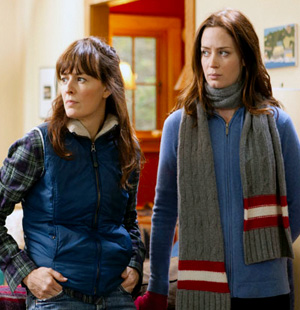

Lynn Shelton’s Your Sister’s Sister is the best argument for Mark Duplass we’ve had so far. Duplass has been working hard in the indie vineyard. Here he plays Jack, a bitter, unemployed Seattleite. At his brother’s memorial ceremony, he’s the only one willing to address the sibling’s bullying, manipulative qualities: “If we’re going to toast the man, let’s toast the man.”
The brother’s ex, Iris (Emily Blunt, swallowing and kind of choking on her British accent) offers Jack her family’s vacation home in Puget Sound as a refuge. Unbeknownst, Iris’ big sister Hannah (Rosemarie DeWitt) is there already to recover from the breakup of her own long-term relationship with a woman. Jack and Hannah get into the tequila, and then into the sack. Matters are complicated by Iris’ hurt feelings, and Hannah’s hidden agenda.
Shelton (Humpday) goes for the realistically unkempt look in dress as well as bed: the wardrobe of hoods, flannels and thermals, compliments the wild night (Jack comes too soon and leans on Hannah’s hair). The wit is all in the come-on: “I would be super open to this,” is Jack’s passive way of trying to lure this lesbian into a man’s bed.
Seeing Hannah, it’s as if the call went out for a young Catherine Keener. They certainly found her. Rosemarie DeWitt has been around: she had the title role in Rachel Getting Married. She was also Midge in Mad Men: the woman who catalyzed that Ozu-like passage where Don Draper was, without any warning, transfixed by a folk song about Babylon.
DeWitt has heavy lashes and bangs and a terrific hawk nose, and is my idea of what Lois Lane would look like. She’s a lowdown moqueuse: when Jack pays her body a heavy compliment, she picks her tooth with her fingernail to show how touched she is. Your Sister’s Sister is capped with a token, petty act of rage that’s meant to look existential but looks more like street vandalism. Still, Shelton gives her actors room to play, and that’s the best thing about her: Duplass looks sly and clever for once instead of stocky and half-asleep. But the shaggy, unfocussed quality of Shelton’s drama leaves the story to go into only one direction: the realm of too-easy reconciliation and affirmation.
R; 90 min.


